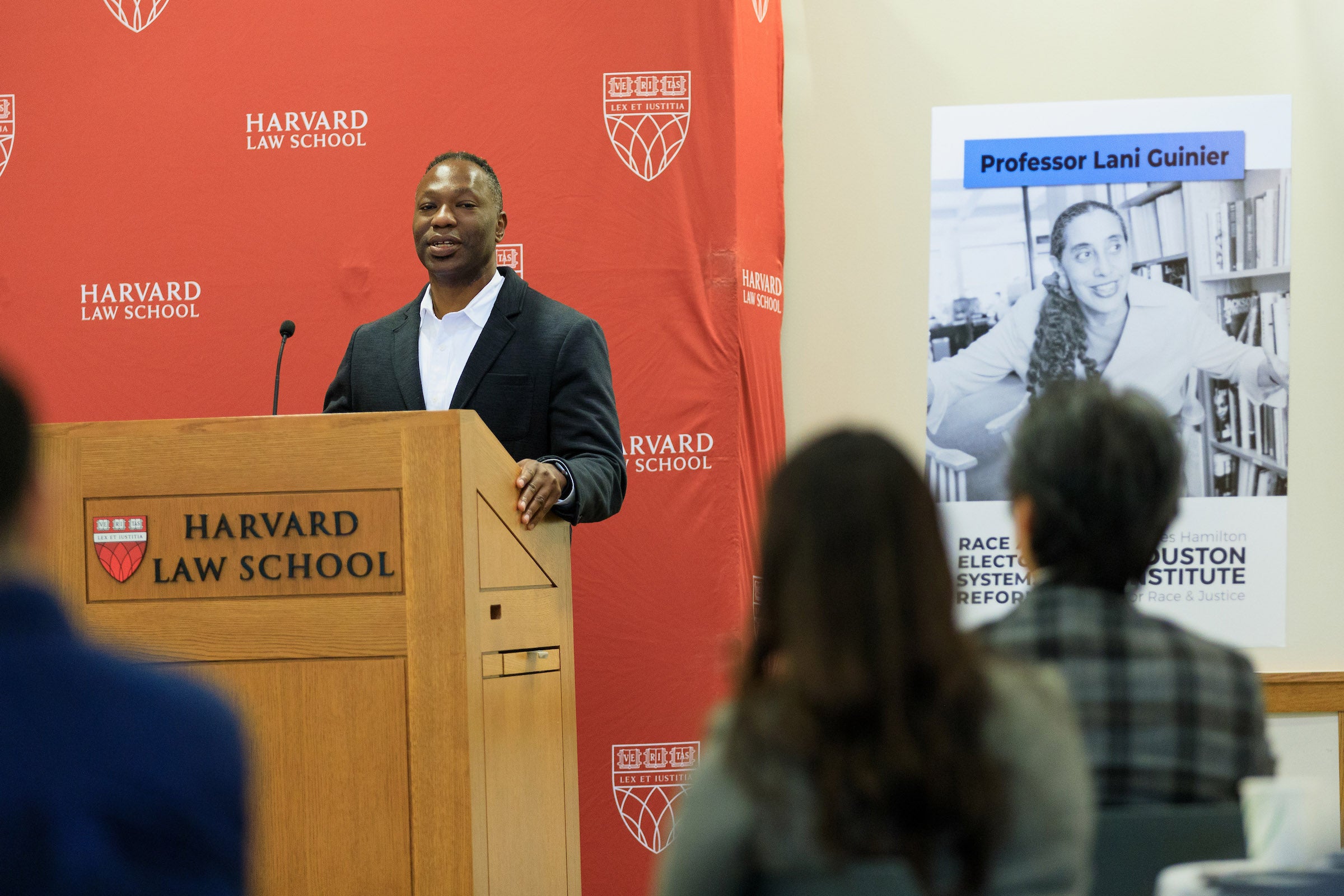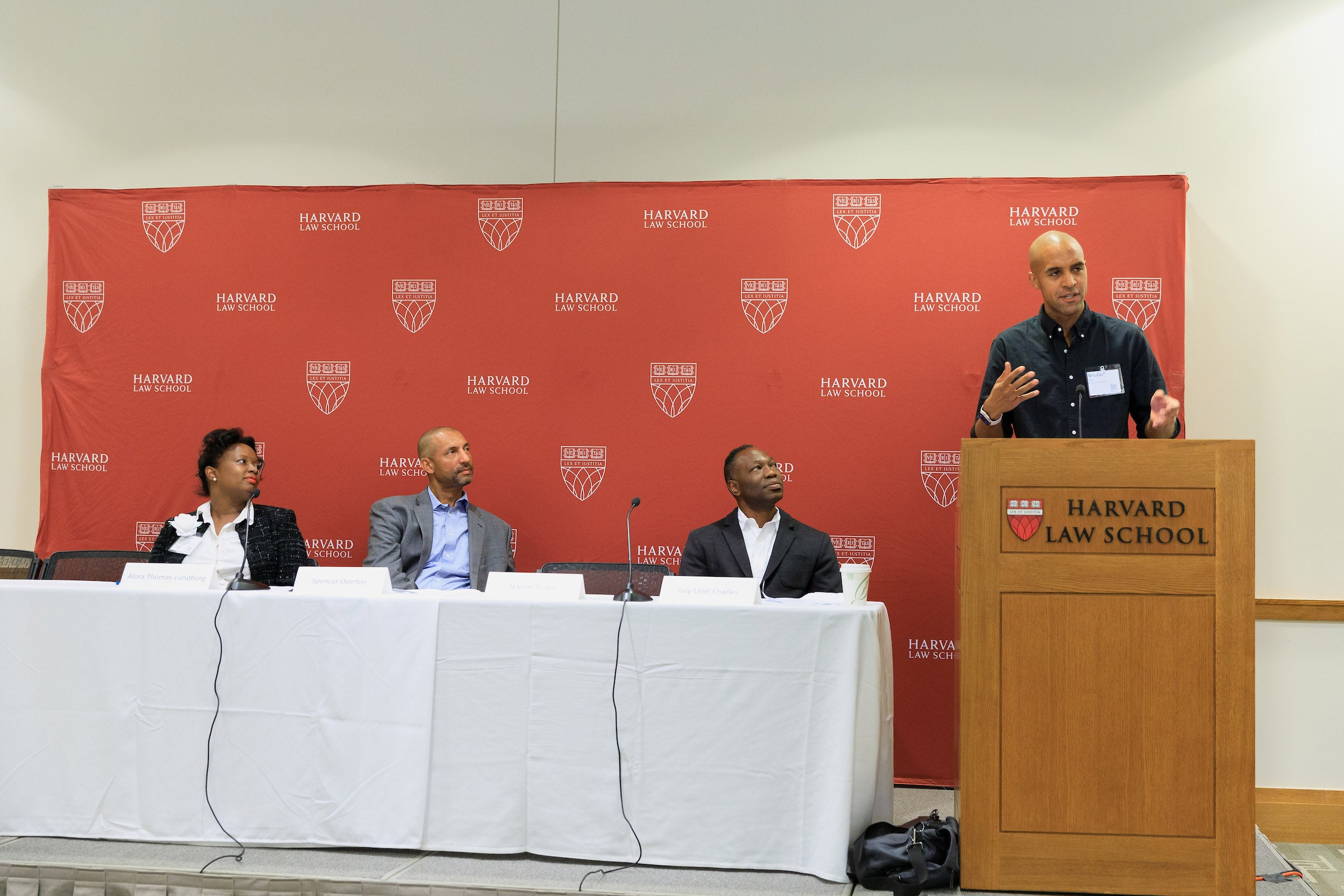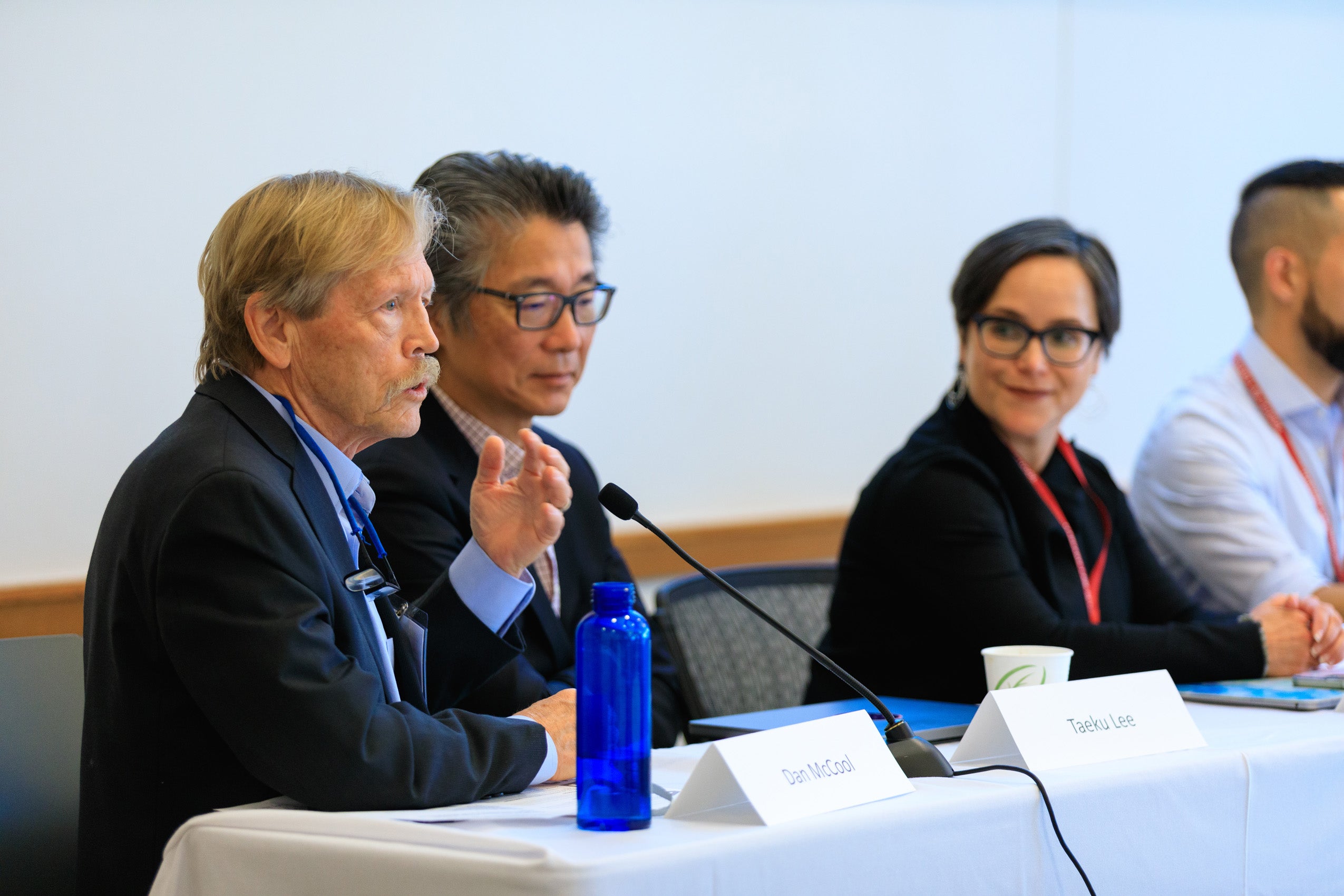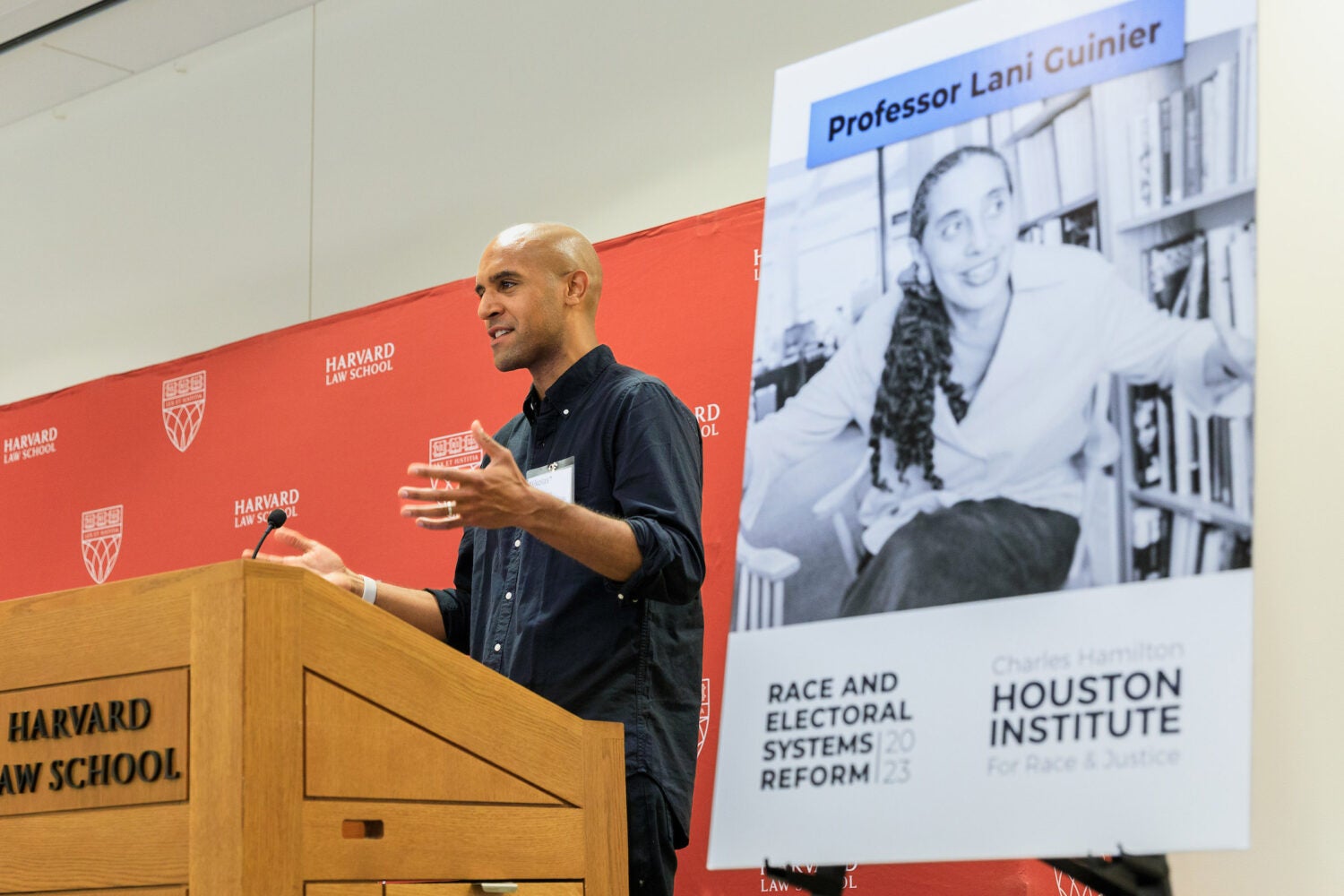Lani Guinier, the late Harvard Law School professor and esteemed legal scholar, was above all a champion of social justice. Her son Nikolas Bowie ’14, Louis D. Brandeis Professor of Law, made that point during two-day seminar on multiracial democracy that was held in her honor last week.
“My mom thought of herself as carrying on the tradition of seeing systems that had excluded people and turning them into systems that could incorporate everybody,” he said. “The principle underlying her work was the principle of fair play.”
Bowie confessed during his talk that, while growing up, he’d never read his mother’s books. Instead, as part of a school reading group, he encountered “Lift Every Voice,” which included his mother’s reflections on President Bill Clinton withdrawing her nomination as assistant attorney general in 1993 after she came under criticism for her views on voting rights.
The book, he recalled, prompted a lively class discussion about whether it is wise to keep quiet about one’s most progressive viewpoints until one attains a position of power: “Why didn’t she just shut up and get the job?” his classmates asked. As the one student who disagreed, Bowie recalled that he stayed out of that discussion and brought the matter up with his mother when he got home.
“She said it sounded like the students in my high school had the same understanding of power as the politicians she’d interacted with,” he recalled. Their view was “that power is something distinct from principle — that you first acquire power and then exercise principle. By contrast, she thought that what she had written was an argument that principle is what you use to build power — that it is important to have ideas, to have relationships, and to use those ideas in order to build a movement. [She said that] our politicians are the sort of people who put their fingers up to see which way the wind is blowing, but it takes a movement to change the wind. That was a really meaningful conversation for me … and so it’s an honor to stand here and see the stirrings of a movement among you as well.”


Participants at the conference, titled “A Convening: Race, Reform and Multiracial Democracy,” which was hosted by the Charles Hamilton Houston Institute for Race and Social Justice, worked to apply Guinier’s philosophy of justice through a series of panels that examined race and electoral systems, electoral law and system reform, and how the system impacts social change and communities of color.
During a conversation on race and electoral systems, University of Utah professor emeritus Daniel McCool argued that electoral reform can only be accomplished through a more sweeping program of social efforts. “What we’re trying to do here is to get an unjust society to produce just elections,” he said. The goal of progressive legislation, he said, may be furthered through grassroots efforts like rides to polling places and language assistance. “But if you look at this together, we’re talking about education. You improve that and people are vocal. A poverty program is also a voting program: You get people out of poverty, and they vote. And we need better health care, because sick people don’t participate.”
Lisa Garcia Bedolla, vice provost for graduate studies at UC Berkeley School of Education, argued that racial injustice is built into the system.
“The system is doing exactly what it was designed to do, which is to exclude. The dysfunction we see now is entirely by design. It’s not by accident that the dominant group in U.S. society started losing faith in democracy after it became more representative [after Obama’s election]. We don’t have a place at the table, so we don’t like the table anymore. So, we need to remember that there is no ‘one size fits all’ option; there are multiple democracies in the U.S.”
Harvard professor of government Taeku Lee concurred: “White Americans thought our elections were just for a long period of time. Then Barack Obama got elected. All the political science I know says that there has never been a society where one group has held a majority of the power that has voluntarily ceded that power after demographic change.”

Northwestern University professor Traci Burch pointed out that many politically engaged citizens choose not to vote, preferring to express themselves through protests and other means.
“Election rules affect who chooses to express their preference through elections in the first place,” she said. “We can’t just assume that turnout is going to follow because people have more candidates who look like them and think like them. We have to realize that it takes a lot of time and money and resources to get people to channel their preferences in the electoral system.”
As part of another panel that looked at election law and electoral systems reform, Ruth Greenwood, director of the Election Law Clinic at Harvard Law School, noted that courts are becoming increasingly hostile to voting rights registration claims, and that community activism is one way forward.
“When you’re a lawyer, you need to educate your client to make an informed choice. And as I fail in more and more litigation, I become increasingly interested in advocacy to change the rules,” she said. One sign of hope, she said, was the strengthening of state voting rights acts. “Granted, these are mostly in blue states. But it still covers about 40 percent of the country’s women of color.”
Sam Hirsch ’93, a partner at Jenner & Block in Washington, D.C., argued for more concrete reform in the design of ballots. He recalled some alarming experiences with the “butterfly ballot” that misaligned candidate listings in Palm Beach County in 2000, causing many voters to vote for conservative candidates by mistake. Local authorities later determined that this may have cost Al Gore the presidency.
“There is no doubt that the ballot changed the outcome,” he said. “Many people voted for Pat Buchanan because of it. I was part of the army of lawyers who went to Palm Beach and it was tragic, because we knew there was no remedy in the courts. But the confusion was very real.”
University of Michigan Law School Professor Ellen Katz made a more sobering point about the insufficiency of Section 2 of the Voting Rights Act, which prohibits discrimination based on minority status. She cited this year’s Allen v. Milligan case as a “warning sign”: While the Supreme Court did uphold voting rights in the Alabama case, Katz suggested that greater and perhaps more successful challenges are to come.
Further, she suggested that citizens’ rights often wind up compromised despite the power to vote. She cited two examples from her home state: One was the Flint water crisis, when local drinking water was found in 2014 to be contaminated with lead and bacteria; remedy has remained slow. Despite numerous federal and local investigations into the health problems caused by Flint’s water, only one minor conviction has been obtained to date; widespread distrust in government has been one result.
“People in Flint had no representation and the act was useless to do anything about it.” Further, she said that such distrust will influence how citizens vote, and even their perception of facts. One example was the widely accepted Republican allegations of voter fraud in Detroit during the last presidential election, all of which were debunked. “The problem is that the report [that there was no fraud] changed nobody’s mind. I don’t know how we can go forward unless we can deal with that element and give people confidence in the system.”
University of Virginia Professor Bertrall Ross concurred that Section 2 “may be on its way out the door,” but noted that the issue of poverty needs to be discussed as well. Racial minorities are not homogeneous, he said, citing his own standing as a Black American who rose out of poverty. Yet the gap in voter turnout between the poor and wealthy has been consistent for 50 years, affecting members of all racial groups.
“Lower income groups believe that their opportunity to make a difference in the system is virtually nil,” Ross said.” So, I would ask, how do we develop hope in these groups?”
